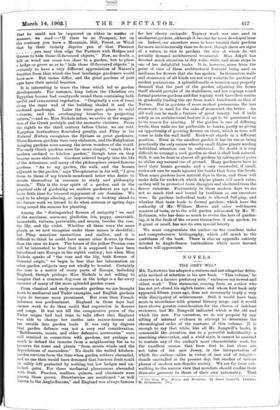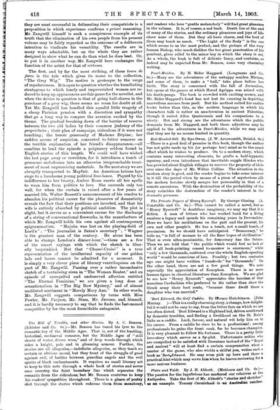NOVELS.
THE GREY WIG.*
Mn. Zanawila. has adopted a curious and not altogether defen- sible method of selection in his new book. "This volume," he observes in a laconic prefatory note, "embraces my newest and oldest work." This statement, coming from an author who has not yet closed his eighth lustre, and whose first book only appeared fifteen years ago, does not necessarily imply a very wide discrepancy of achievement. Still, it would have bean more in accordance with general literary usage, and it would have shown greater consideration for the chorus of indolenb reviewers, bad Mr. Zangwill indicated which is the old and which the new. For ourselves, we do not propose by any sifting of internal evidence to attempt to determine the chronological order of the contents of this volume. It is enough to say that while, like all Mr. Zangwill's books, it commands the attention due to a powerful individuality, a searching observation, and a vivid style, it cannot be asserted to contain any of the author's most characteristic work, for the excellent reason that from first to last these are not tales of the new Jewry, in the interpretation of which the author—alike in virtue of race and of insight— stands unrivalled .at the present day, but studies of various phases of modern non-Semitic society. We are far from sub- scribing to the narrow, view that novelists should confine their dramatis personae to those of their own nationality. That • The Grey Wig: Stories and Novelettes. By Israel Zangwill. London: W. Heinemann. [6s.] they are most successful in delineating their compatriots is a proposition in which experience confirms a priori reasoning. Mr. Zangwill himself is such a conspicuous example of its truth that the elimination of his own people from his present volume may be fairly regarded as the outcome of a deliberate intention to vindicate his versatility. The results are in many ways admirable, but on the whole they are rather designed to show what he can do than what be does best. Or, to put it in another way, Mr. Zangwill here exchanges the function of the artist for that of virtuoso.
The first, and by far the most striking, of these tours de force is the tale which gives its name to the collection, "The Grey Wig." The motive is grotesque to the verge of repulsiveness. It is open to question whether the humiliating stratagems to which lonely and impoverished women are re- duced to keep up appearances are fair game for the novelist, and when the device in question is that of going half-shares in the purchase of a grey wig, there seems no room for doubt at all. Yet Mr. Zangwill has handled this squalid little tragedy of a cheap Parisian pension with a discretion and sympathy that go a long way to conquer the aversion excited by the theme. The gradual breaking down of the barrier of reserve between the two old ladies by their common jealousy of the proprigtaire ; their plan of campaign, ridiculous if it were not touching; the heroic generosity of Madame Depine ; her sudden access of suspicion, converted to bitter remorse on the terrible explanation of her friend's disappearance,—all combine to lend the episode a poignancy seldom found in English stories of this length. We could well have wished the last page away or rewritten, for it introduces a touch of gruesome melodrama into an otherwise irreproachable treat- ment of most unpromising materials. In the next story we are abruptly transported to Mayfair. An American heiress lays siege to a handsome young political free-lance. Piqued by his indifference to her beauty, Amber Roan exerts all her spells to wean him from politics to love. She succeeds only too well, for when the curtain is raised after a few years of married life, Walter Bassett's announcement of his resolve to abandon his political career for the pleasures of domesticity reveals the fact that their positions are inverted, and that his wife is entirely absorbed by political ambition. The plot is slight, but it serves as a convenient excuse for the discharge of a string of conversational fireworks, in the manufacture of which Mr. Zangwill holds his own against all contemporary epigrammatists. " Majuba was lost on the playing.field of Lord's " ; "The journalist is Satan's secretary " ; "Wagner is the greatest man of the century. He alone has been able to change London's dinner-hour,"—these are a few of the smart sayings with which the sketch is liber- ally besprinkled. But that " Ohasse-Croise " is a true representation of the intellectual capacity of our golden lads and lasses cannot be admitted for a moment. It is simply a very clever piece of literary ventriloquism on the part of Mr. Zangwill. Passing over a rather inconclusive sketch of a tantalising siren in "The Woman Beater," and an episode of unrequited and undeserved affection entitled "The Eternal Feminine," we are given a long dose of sensationalism in "The Big Bow Mystery," and of almost undiluted sentiment in "Merely Mary Ann." In other words, Mr. Zangwill suggests comparisons by turns with MSS Fowler, Mr. Farjeon, Mr. Sims, Mr. Jerome, and, himself, and it is hardly necessary to say that he finds the laet-named competitor by far the most formidable antagonist.











































 Previous page
Previous page